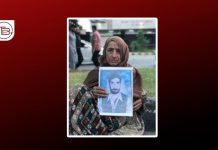Security forces in Panjgur have arrested Mulla Farhaad, a prominent leader of the Haq Do Tehreek, under Maintenance of the Public Order Act(3-MPO). According to local sources, the arrest was carried out without a formal charge, and no official explanation has been issued so far.
Mulla Farhaad’s detention comes amid a wave of arrests targeting political workers and leaders across Balochistan under the same controversial legal provision. Leaders of the Baloch Yakjehti Committee (BYC), including Dr. Mahrang Baloch, Beebow Baloch, Beebarg Baloch and his brother Dr. Hammal Baloch, Gulzadi Baloch, and Shaji Sibghatullah, remain behind bars under 3-MPO orders. The leader of the Balochistan National Party (BNP), Sardar Akhtar Mengal, has also been served 3-MPO orders, although he has not yet been detained.
What is 3-MPO?
Maintenance of the Public Order Actis a colonial-era legal tool that allows the district administration — specifically the Deputy Commissioner — to detain individuals considered a “threat to public order” without filing formal charges. Initial detention can last up to 30 days and may be extended further, all without the need for a court trial. Authorities typically issue a notice explaining the reason for arrest, but due process and judicial scrutiny are not required.
Although originally intended as a preventive measure, 3-MPO has long been criticized for its misuse against political dissent. Human rights organizations, legal experts, and civil society groups argue that the law is routinely used to stifle freedom of expression and suppress peaceful political activism.
Colonial Roots, Modern Repression
The law traces its origins back to British colonial rule in India, when similar public safety and defense laws were used to crush nationalist movements and detain political activists without trial. After the partition of the subcontinent, Pakistan retained many of these legal frameworks. During General Ayub Khan’s regime in the 1960s, the Maintenance of Public Order Ordinance was formally introduced to “preserve public order” — granting sweeping powers to the state.
In present-day Balochistan, the law has resurfaced as a key mechanism in the state’s crackdown on dissent. Rights groups argue that the state is using 3-MPO to arbitrarily silence protestors, political activists, and community leaders.






























